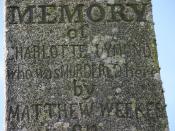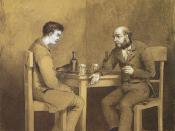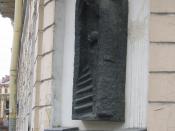A Happy Ending Many books have "happy endings," but often readers have the best response when that "happy ending" is gained through moral development. This process is seen clearly in Raskolnikov, the main character of the non-Christian fiction Crime and Punishment, written by Fyodor Dostoyevsky. Raskolnikov is a former university student who lives in Petersburg, Russian in the 1800s. He faces a psychological struggle that changes his entire life when he decides to confront it. In the ending of the novel, Raskolnikov reaches moral reconciliation, which resolves his inner struggle seen throughout the book.
As soon as the tale begins, Raskolnikov, a 22-year-old, handsome man, has a psychological struggle that leads him to commit a horrendous crime. Without any explanation, he desperately desires to be isolated from society, to the extremity of delirium. Walking out of his garret, he avoids every person, including his landlady who brings him food regularly.
He also has repulsive thoughts about killing a mean pawnbroker named Alyona Ivanovna, yet he is astonished with himself for having such thoughts. As he struggles with these awful thoughts, Raskolnikov remembers that as a child he witnessed the cruel murder of a horse, and the desperate desire to cruelly murder the pawnbroker the same way grows. Believing he is justified in committing a crime because of his nature, Raskolnikov becomes physically ill with a fever and shivers as he prepares for the murder.
Not truly believing he would carry out his desire and become a murderer, Raskolnikov's inner struggle to kill becomes stronger and more conflicting when he actually murders Alyona Ivanovna and her sister, Lizabeta Ivanovna. He feels forced to kill Lizabeta because she witnesses Alyona's grotesque murder when she walks into the room. After the murder, he walks to his garret and lays on...


